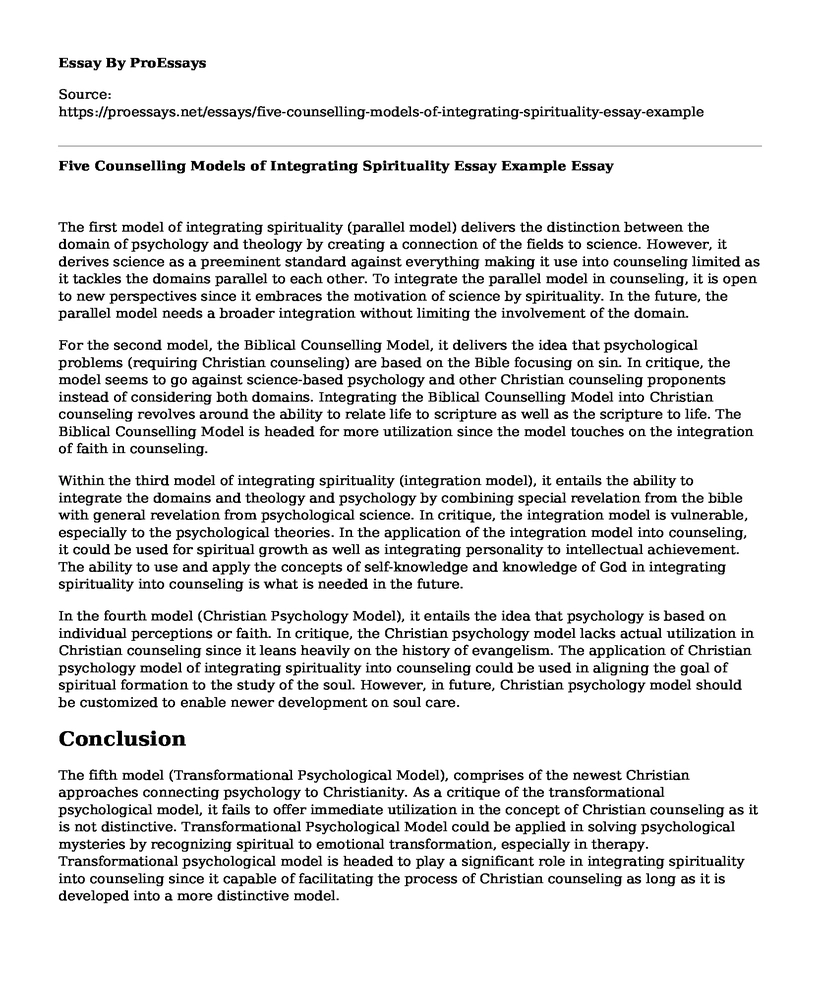The first model of integrating spirituality (parallel model) delivers the distinction between the domain of psychology and theology by creating a connection of the fields to science. However, it derives science as a preeminent standard against everything making it use into counseling limited as it tackles the domains parallel to each other. To integrate the parallel model in counseling, it is open to new perspectives since it embraces the motivation of science by spirituality. In the future, the parallel model needs a broader integration without limiting the involvement of the domain.
For the second model, the Biblical Counselling Model, it delivers the idea that psychological problems (requiring Christian counseling) are based on the Bible focusing on sin. In critique, the model seems to go against science-based psychology and other Christian counseling proponents instead of considering both domains. Integrating the Biblical Counselling Model into Christian counseling revolves around the ability to relate life to scripture as well as the scripture to life. The Biblical Counselling Model is headed for more utilization since the model touches on the integration of faith in counseling.
Within the third model of integrating spirituality (integration model), it entails the ability to integrate the domains and theology and psychology by combining special revelation from the bible with general revelation from psychological science. In critique, the integration model is vulnerable, especially to the psychological theories. In the application of the integration model into counseling, it could be used for spiritual growth as well as integrating personality to intellectual achievement. The ability to use and apply the concepts of self-knowledge and knowledge of God in integrating spirituality into counseling is what is needed in the future.
In the fourth model (Christian Psychology Model), it entails the idea that psychology is based on individual perceptions or faith. In critique, the Christian psychology model lacks actual utilization in Christian counseling since it leans heavily on the history of evangelism. The application of Christian psychology model of integrating spirituality into counseling could be used in aligning the goal of spiritual formation to the study of the soul. However, in future, Christian psychology model should be customized to enable newer development on soul care.
Conclusion
The fifth model (Transformational Psychological Model), comprises of the newest Christian approaches connecting psychology to Christianity. As a critique of the transformational psychological model, it fails to offer immediate utilization in the concept of Christian counseling as it is not distinctive. Transformational Psychological Model could be applied in solving psychological mysteries by recognizing spiritual to emotional transformation, especially in therapy. Transformational psychological model is headed to play a significant role in integrating spirituality into counseling since it capable of facilitating the process of Christian counseling as long as it is developed into a more distinctive model.
Cite this page
Five Counselling Models of Integrating Spirituality Essay Example. (2022, Sep 21). Retrieved from https://proessays.net/essays/five-counselling-models-of-integrating-spirituality-essay-example
If you are the original author of this essay and no longer wish to have it published on the ProEssays website, please click below to request its removal:
- Paper Example on Concept of Sociology of Emotions
- Pharmacological Management of Anxiety and Depression
- Essay Example on Dreams: Maintaining Emotional and Mental Balance
- Essay Example on Personality Disorders: Challenging the 21st Century Diagnosis
- Essay Example on Re-Evaluate Goals for Personal Change Success
- Theory X & Y: Human Work Inspiration & Management - Essay Sample
- Essay Example on Overcome Stress: 10 Survival & Coping Strategies







